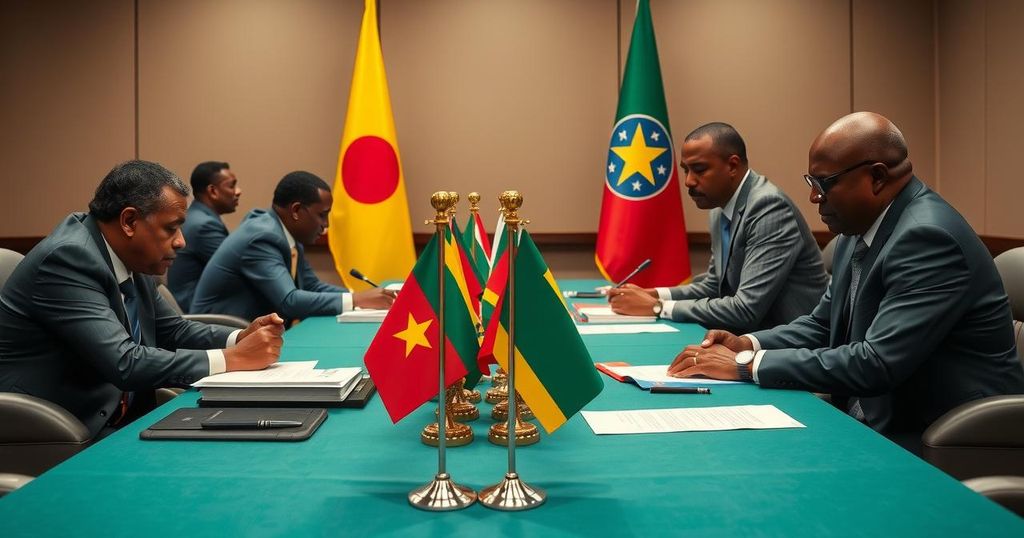Ethiopia and Somalia Aim to Rebuild Relations Through Diplomatic Engagement in Mogadishu

Ethiopia’s Minister of Defense, Aisha Mohammed, is visiting Mogadishu to strengthen diplomatic relations between Ethiopia and Somalia, following tensions over a maritime agreement. Discussions will focus on transitioning Ethiopian troops and enhancing security cooperation to combat shared threats, particularly from the Al-Shabaab group. Egypt has also committed troops to assist in Somalia, reflecting broader regional efforts to stabilize the country.
Ethiopia’s Minister of Defense, Aisha Mohammed, is heading a diplomatic delegation to Mogadishu, aiming to rectify strained relations between Ethiopia and Somalia. The visit follows heightened tensions stemming from Ethiopia’s memorandum of understanding with Somaliland, which Somalia perceives as infringing upon its sovereignty. This engagement seeks to reinforce the Ankara Declaration, facilitating the transition of Ethiopian troops from the African Union Transition Mission in Somalia (ATMIS) to the newly established African Union Support to Somalia Mission (AUSSOM).
Both Ethiopia and Somalia acknowledge the need for enhanced security cooperation amid ongoing concerns regarding the Al-Shabaab militant group. The presence of approximately 3,000 Ethiopian forces has been contentious; however, the two nations are poised to address mutual security threats and reaffirm commitments made during the Ankara agreement. Furthermore, Egypt’s pledge to send over 5,000 troops to AUSSOM reflects a growing regional consensus on supporting Somalia’s stability and sovereignty.
Minister Aisha Mohammed, recognized for her advocacy for gender equality within Ethiopian leadership, significantly amplifies the diplomatic discussions, symbolizing Ethiopia’s proactive approach to mending ties despite previous diplomatic strains. This visit potentially marks a transformative step towards diplomatic reconciliation, stability, and cooperative security efforts within the Horn of Africa.
The diplomatic relations between Ethiopia and Somalia have been fraught with complexities, particularly following a controversial maritime agreement signed in 2024. This agreement included Ethiopia’s accord with the breakaway region of Somaliland, which sparked significant opposition from Somalia, leading to accusations of sovereignty violation. The political climate was further strained by Somalia’s threats to expel Ethiopian troops. The recent decision to undertake high-level talks underlines the urgent need for both nations to navigate their differences and collaborate on regional security challenges, particularly concerning the threat posed by Al-Shabaab. Egypt’s involvement indicates a wider interest in the stability of the region, as various nations become stakeholders in fostering a secure environment for Somalia. The Ankara Declaration serves as a critical framework for these discussions, reflecting shared aspirations for normalization of relations and a concerted effort towards transitioning military missions in Somalia. Such cooperation is essential not only for the relationship between Ethiopia and Somalia but also for the larger geopolitical stability in the Horn of Africa.
In summary, the visit of Ethiopia’s Minister of Defense, Aisha Mohammed, to Mogadishu symbolizes a significant effort to mend ties between Ethiopia and Somalia, amidst previously strained relations due to contentious agreements and troop presence. By focusing on security cooperation and the implementation of the Ankara Declaration, both nations aim to address regional threats effectively, particularly from militant groups such as Al-Shabaab. The involvement of Egypt further underscores the regional commitment toward stabilizing Somalia, indicating that collaborative efforts are crucial for sustainable peace and security in the Horn of Africa.
Original Source: www.garoweonline.com







